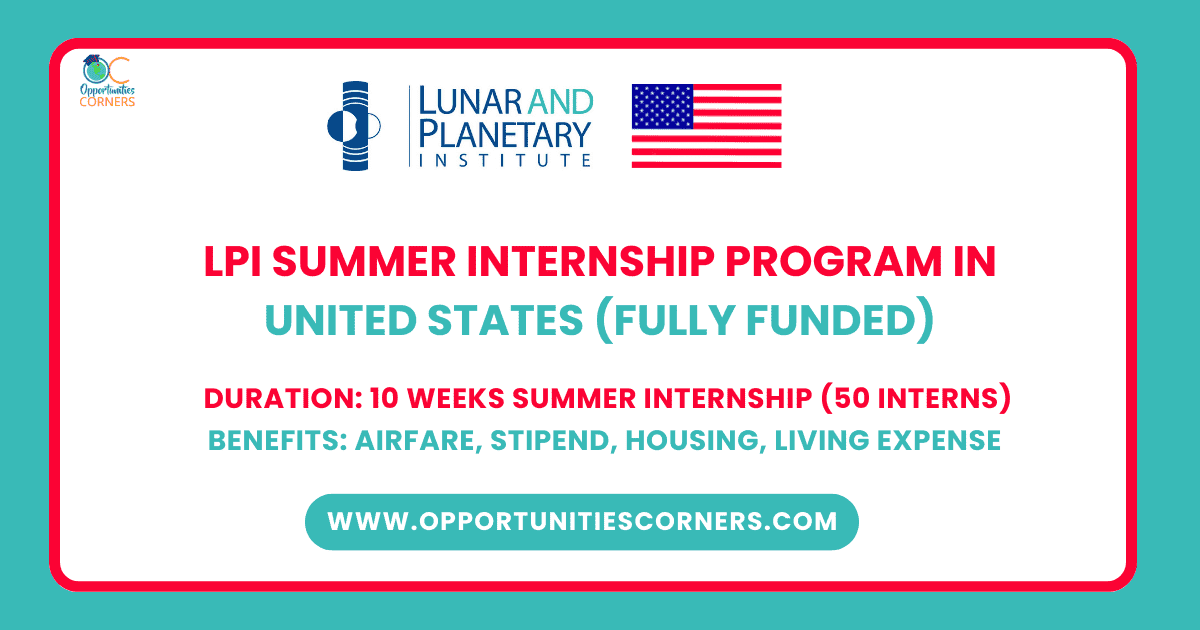2026 LPI Summer Internship in United States (Fully Funded)

Fully Funded LPI Summer Internship in the U.S. Opens Applications for 2026
The Lunar and Planetary Institute (LPI) is now accepting applications for its fully funded Summer Internship in Planetary Science, scheduled for June 1 – August 7, 2026, at either the LPI or NASA Johnson Space Center in Houston, Texas. This 10-week program offers both U.S. and international undergraduate students a chance to engage in cutting-edge research under the guidance of leading planetary scientists, providing invaluable experience and career insights.
Program Details and Financial Support
The LPI Summer Internship aims to cultivate the next generation of planetary scientists. The program provides comprehensive financial support to accepted interns, covering travel expenses, housing, and living costs. Interns will receive a total of $13,351, allocated for airfare, a stipend, and housing expenses paid directly to the vendor. An additional bonus allowance of $1,500 is available for interns who successfully complete the program and meet all requirements.
Duration: 10 Weeks Dates: June 1 – August 7, 2026 Location: Lunar and Planetary Institute or NASA Johnson Space Center, Houston, Texas Funding: Fully Funded (Travel, Stipend, Housing, Living Expenses) Deadline: December 12th, 2025
Eligibility Criteria
The LPI internship is open to undergraduate students worldwide who have completed at least 50 semester hours of credit. While students majoring in Physical or Natural Sciences, Engineering, Computer Science, or Mathematics are preferred, all eligible students are encouraged to apply. Notably, the program does not require IELTS scores, offering flexibility for international applicants.
Applicants must complete an online application form, submit at least two reference letters (maximum of three), and provide official transcripts. Proof of English language proficiency is required, and can be demonstrated through a TOEFL score, IELTS score, or a letter from the applicant's current institution confirming their English language skills.
Historical Context and Current Relevance
The LPI Summer Internship program has a long-standing history of fostering talent in planetary science. For decades, similar programs have played a crucial role in workforce development within the space exploration sector. "These internships are vital for attracting and retaining bright minds in STEM fields," explains Dr. Emily Carter, a professor of planetary geology at Caltech, who has mentored numerous interns throughout her career. "They provide invaluable hands-on experience and networking opportunities that can shape a student's career trajectory."
The current emphasis on space exploration, fueled by both government initiatives and private sector investments, underscores the importance of cultivating a skilled workforce. Programs like the LPI internship contribute directly to this need, ensuring a pipeline of qualified professionals ready to tackle the challenges of future missions and research endeavors.
Expert Perspective
Dr. David Morrison, a renowned planetary scientist and former director of the NASA Ames Research Center, emphasizes the significance of such programs in promoting diversity within the field. "Internships like the LPI program can be instrumental in providing opportunities to students from underrepresented backgrounds," he notes. "By offering financial support and mentorship, these programs can help to level the playing field and ensure that the future of planetary science reflects the diverse perspectives of our society."
Application Process
Interested candidates must apply through the online application form available on the LPI website. Paper applications are not accepted. Applicants should carefully review the application guidelines and ensure all required documents are submitted by the deadline of December 12th, 2025.
Looking Ahead
The LPI Summer Internship offers a unique opportunity for aspiring planetary scientists to gain valuable research experience, network with leading experts, and explore potential career paths. As the field of space exploration continues to evolve, programs like this will remain essential in nurturing the talent needed to drive future discoveries and innovations.
Originally sourced from: Opportunities Corners
